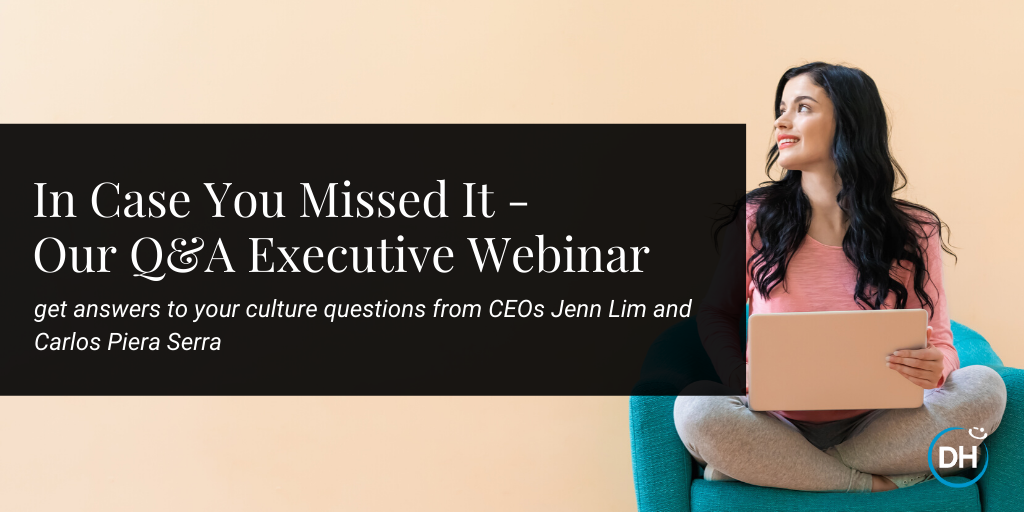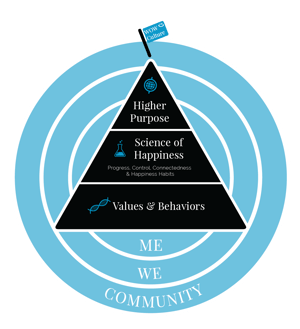
As one of our best webinars yet, our live Q&A session with CEOs Jenn [DH Global] and Carlos [DH Spain] opened up conversations around your specific questions about building or changing your company culture. Participants got to interact with Jenn and Carlos as they answered attendees’ concerns about how to adapt to the future of work and create a better workplace that is engaging, productive, and meaningful. Whether you’re a manager, CEO, or director, this webinar hits on some common challenges that we notice our clients all over the world are also facing. Watch the webinar and read some of the highlights:
Who joined:
Our attendees came from all sorts of places around the globe - from Indianapolis to Honolulu to Bath. Jenn joined from her home base in the Bay Area and Carlos connected with us from Barcelona. As DH continues to grow our international presence like with our partnerships in Japan and Egypt, we’ll be able to gather more perspectives on how to create universal changes to the evolving workplace.
Here are some questions and answers [but not all!] from the webinar:
At 8:55 - “What should our approach be when there are ‘command and control’ decision-making practices in place?”
If you’re not quite familiar, ‘command and control’ derives its meaning from a military way of a leader giving commands and with the resulting action being followed through completely by subordinates. Similarly, with parenting children, it most relates to “do as you’re told.” In the business sense, this micromanagement approach is still relevant and used today but may not be the best strategy when it comes to culture.
In the future of work, more and more organizations are realizing they have to solve very complex challenges differently and more quickly than ever before. To stay competitive and sustainable, businesses have to adapt fast. Command and control isn’t going to be the fastest way to do it if you’re relying on leadership to be ‘in the know’ to make every little decision - that’s why so many organizations are looking to grant autonomy to employees through self-management so that the individual can be an agile representative of the business’ strategy.
At 14:45 - “What does a healthy, happy culture look like? What KPIs [key performance indicators] should we be measuring for?”
When it comes to how DH defines what a healthy, happy culture looks like, we rely on the DH Blueprint [model] to guide that unique culture for every one of our clients. In it, we have different elements like higher purpose and values that play into creating a culture that is engaging, scalable, and profitable. Every organization has a different culture, but a successful one follows the DH model.
The KPIs depend on your business goals - some hard KPIs include measuring turnover, retention, and sales. There are also soft KPIs that may get easily overlooked by executives only worried about the bottom line, but they’re just as important as understanding how impactful your culture really is.
To get a taste on how to measure culture, you can take our individual assessment of the Delivering Happiness Index here.
At 24:40 - “Even with turnover in staff and leadership it seems that the previous toxic culture prevails. How do we work to impact this?”

There’s a common assumption that when toxic people leave, the culture will get better. In some cases this is true, but in others, there’s more work to be done by leadership to build on the foundation of what the culture should be.
To reduce that risk or variability, it’s important to figure it out. At DH we use our specific universal framework to guide companies on how to create that foundation [same one referenced in the KPI question above].
At 27:55 - “If the company is opening new locations/offices/franchises, how can we scale culture in the same way we scale other operations?”
There are few initiatives we tap into to do this with clients involving communication channels, building the culture foundation with leadership and people teams, and creating a culture-training program that can be rolled out to the rest of the organization. Traditionally when a company expands, culture isn’t a priority when it comes to scaling yet it is an essential component in maintaining the quality and uniqueness of what made your business successful in the first place.
When it comes to franchises, you can still share the brand, values, and such with franchise owners. For those pieces of your culture to actually be lived, you really have to inspire franchise owners to keep the culture alive within their stores/restaurants. How can you do that? Take a look at the franchise training program you have and see where there are opportunities to tell the story of your business in a way that inspires people beyond just profits. Also, pick franchisees that share in your company’s values!
.jpg?width=600&name=Image%20from%20iOS%20(9).jpg)
At 40:50 - How do we get C-level leaders to “walk the talk” when it comes to culture? And what personal transformation does it involve?
The first step is to get the buy-in of leadership to start prioritizing culture. The way to do this depends on the leader. Some executives respond better to data points like improvements in employee engagement and productivity, while others relate better to stories of impact and transformation. Once that buy-in is there, we dive deeper into what challenges they’ll face through executive mentoring and coaching to see how the individual can see themselves as an integral part of their culture change.
Start using our universal framework to create a sustainable foundation for your organizational culture:

Bri is the Impact Storyteller on the Delivering Happiness team. Working previously as a freelancer, her goal has always been to work with passionate people who are focused on helping individuals and businesses find their purpose. As part of DH, she now gets to accomplish that every day. Bri resides in Arizona and is lucky enough to enjoy the sun all year round.